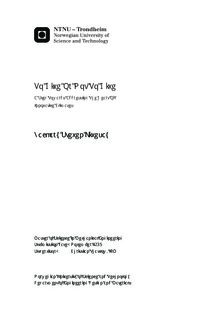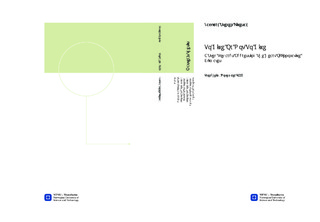| dc.description.abstract | Innovative climates are largely affected by the relationships between the individualsinvolved. This thesis addresses the topic of trying to improve the quality ofrelationships by giving engineers some tools and principles to understand in order forthem to be able to contribute positively to a creative and productive atmosphere.Through the experiences drawn from universities both in India and Bhutan, thestudent tries to grasp some fundamental ideas about human values that can be sharedto other engineers in practical manner.This thesis begins by concentrating the importance of human relationships within aninnovative process and within an organization. It has been found that groups andorganizations perform better and have better cultures if people are willing to give helpunconditionally. Based on this underlying idea of unconditional giving, this thesisintroduces a model or principle called the box which is a state of mind that oneenters into when one self-betrays and is led to self-deception. In this self-deceived stateone has betrayed one s inner feeling to do something for someone (for example notreplying to an email, not holding open a door for a colleague etc.) and thus begins tojustify this betrayal in one s mind by creating a distorted picture of reality. From thisstate of mind, one does not contribute positively to one s work or to one s relationshipsand it becomes clear that this betrayal is a betrayal of the heart. In order to increasethe awareness of the heart and help build resilience from entering into the box , thethesis provides a method to get in touch with one s heart through biofeedbackmeasurements.Finally, the thesis addresses how we make value judgments, which is ultimately whatdefines our motives and behaviors in our homes and workplaces. It can be concludedthat our value judgments are made by the combination of our heart, mind and will.Thus, by consciously learning more about our hearts, minds and will, how theyfunction together and deepen more on what we find valuable, we can consciouslybegin the process of self-development. Through the process of self-development weincrease our inner power (power over self) which is fundamentally different thanexternal power (power over others). The thesis concludes that in order for us tocontribute more positively to our innovative climates we have to increase our innerpower. This is only done through the process of self-development where oneconcentrates on making continuous value judgments in alignment with the valuesupremacy of the human being. This process is not automatic and needs to bepursued consciously and directly however, as of now, the distribution of this type ofknowledge is outside of the curriculum for engineering students. If we dedicate moreenergy to understanding the process of making value judgments, we can contributemore positively to our innovative climates. | nb_NO |

